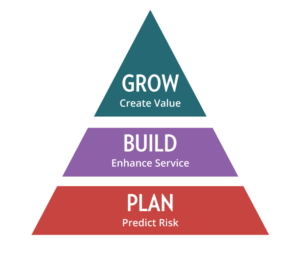Capacity Planning as a Preventative Measure
 Keeping your business running smoothly is very important, and using capacity planning as a preventative measure is one method of doing this. Not only can you save yourself resources by not overestimating your needs, but you can prevent breakdowns in your system as well as slow network times by making sure you have the right amount of infrastructure now for your business to prosper.
Keeping your business running smoothly is very important, and using capacity planning as a preventative measure is one method of doing this. Not only can you save yourself resources by not overestimating your needs, but you can prevent breakdowns in your system as well as slow network times by making sure you have the right amount of infrastructure now for your business to prosper.
Capacity planning is estimating the software, hardware, and bandwidth your business will need, as well as the traffic it will experience as the company grows. Since the primary goal of proper capacity planning is to save you resources and money, you want to make sure that your choices are cost-efficient. Does it make sense to purchase a large server that you may not grow into before it becomes obsolete? Do you have the necessary bandwidth to handle your operations during normal traffic levels, but also if there is a peak in demand? By planning ahead of time, you can make sure you get the equipment and services you need to grow before you need them and without overspending.
Consolidating data into a single repository may also be a smart choice. If you can move commonly used data from your primary server but keep it accessible on your network you can save space and speed up your system time. You can also invest in products that scale up as you grow. These products require a minimum of capital going in and can be enhanced gradually as your needs increase. Be sure that any equipment and software you do purchase, however, is supported by the manufacturers so that you can get assistance with them and updates for them when needed. It defeats the purpose of your capacity planning to have to repurchase software and equipment.
What is your IT professional-to-staff ratio? Many businesses find that hiring a consultant instead of keeping an in-house IT employee not only saves them money, but also allows them to access people trained in cutting-edge practices. Utilizing this resource can save you the cost of having a full-time staff member, plus the specialist will also be able to help you develop your capacity plan and implement it with minimal risk and cost to your business. This expertise can save you time and any additional efforts as your business grows; after all, your needs will have been well forecast and already met.
Using capacity planning as a means of preventing the loss of time and resources down the road is a smart move. Planning for future growth and needs will ensure that your company runs smoothly as it expands. With a minimum of risk and expense, you can be free to efficiently manage your business as a whole instead of dealing with critical capacity issues after they become a problem.
About the author